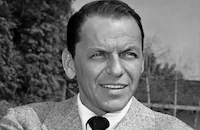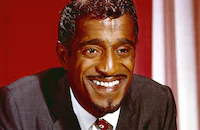In June 1971, Frank Sinatra retired at the age of 55 with a "final" concert at the Ahmanson Theater in Los Angeles. The show, attended by a number of celebrities, featured 11 songs he considered key to the trajectory of his career and life. Two and a half years later, he returned to performing with this television special and companion record album, which reached number 13 on the Billboard charts. Having considered himself no longer relevant to the popular music scene only a short time earlier, with this show Sinatra began a new phase of his career that, despite diminishment in his iconic voice, occasional memory lapses, and steadily failing health, brought new albums, television appearances, and packed concerts across the globe for the next 20 years.
This special was actually called Magnavox Presents Frank Sinatra, but because it aired November 18, 1973, just a month after his hit album "Ol' Blue Eyes Is Back" dropped, it has come to be known by the album name.
Several celebrities were once again in the audience, among them Fred Astaire, Lucille Ball, and Sammy Davis Jr. Sinatra was joined on stage by Gene Kelly, with whom he made three hit musicals in the 1940s when both were under contract to MGM: Anchors Aweigh (1945), Take Me Out to the Ball Game, (1949), and On the Town (1949), which in 2006 ranked Number 19 on the American Film Institute's list of the best film musicals of all time. Kelly joined Sinatra for some reminiscences and banter, a few song-and-dance routines, and clips from their movie partnership.
According to the showbiz memoir Colored Lights by the musical writing team of John Kander and Fred Ebb (Cabaret, Chicago), as told to Greg Lawrence, Sinatra wanted popular comedian and sitcom star Redd Foxx (Sanford and Son) to be his guest on the special. Ebb, who was the special's writer, told him he had no idea how to write for Foxx and pushed for Kelly. Sinatra reluctantly agreed, although Ebb said he was never happy about it. "I honestly don't know why," Ebb said. "Frank used to call him 'Shanty.' That was his nickname for Gene, and I thought that was a little belittling right there. But Gene didn't seem to mind. He was the sweetest man, always humble and gracious."
Under the musical direction of Don Costa and longtime Sinatra arranger Gordon Jenkins, he performed many of his old standards as well as the newer numbers "You Will Be My Music" and "Send in the Clowns." He and Kelly also did a number Kander and Ebb wrote especially for the show, "We Can't Do That Anymore," in which they spoofed the notion of being over the hill by showing just how well they could still sing (the nearly 58-year-old Sinatra) and dance (Kelly, who was then 61).
Beyond that, Sinatra was not so willing to do anything very self-deprecating. Ebb wrote several bits for him based on stories the star had told him. One involved the necessity for Sinatra to stand on a box to do a love scene with French leading lady Michele Morgan in Higher and Higher (1943). Ebb put that in the script, but on the day of the taping (the first time the star had even glanced at the script), Sinatra insisted it be removed. There were several such last-minute edits, which Ebb said left holes in the show.
The program was nominated for two Emmy Awards, for Outstanding Comedy-Variety, Variety or Music Special and Best Directing for Marty Pasetta, who directed many of the Academy Award broadcasts of the 1970s and 80s. The show was produced by Howard W. Koch, who produced six of Sinatra's pictures, including one of his best, The Manchurian Candidate (1962).
Director: Marty Pasetta
Producer: Howard W. Koch
Writer: Fred Ebb
Cinematography: William Klages
Editing: Jerry Greene
Production Design: John DeCuir
Conductors/Arrangers: Don Costa, Gordon Jenkins
C-60m.
By Rob Nixon
Frank Sinatra: Ol' Blue Eyes is Back

Brief Synopsis
Ol' Blue Eyes confidently delivers a slate of quintessentially Frank tunes.
Cast & Crew
Read More
Marty Pasetta
Director
Frank Sinatra
Himself
Gene Kelly
Himself
Sammy Davis Jr.
Himself
Fred Astaire
Himself
Lucille Ball
Herself
Film Details
Also Known As
Magnavox Presents Frank Sinatra
Genre
Documentary
Music
Release Date
1973
Technical Specs
Duration
60m
Synopsis
Ol' Blue Eyes confidently delivers a slate of quintessentially Frank tunes.
Director
Marty Pasetta
Director
Film Details
Also Known As
Magnavox Presents Frank Sinatra
Genre
Documentary
Music
Release Date
1973
Technical Specs
Duration
60m
Articles
Frank Sinatra: Ol' Blue Eyes is Back

Frank Sinatra: Ol' Blue Eyes is Back
In June 1971, Frank Sinatra retired at the age of 55 with a "final" concert at the Ahmanson Theater in Los Angeles. The show, attended by a number of celebrities, featured 11 songs he considered key to the trajectory of his career and life. Two and a half years later, he returned to performing with this television special and companion record album, which reached number 13 on the Billboard charts. Having considered himself no longer relevant to the popular music scene only a short time earlier, with this show Sinatra began a new phase of his career that, despite diminishment in his iconic voice, occasional memory lapses, and steadily failing health, brought new albums, television appearances, and packed concerts across the globe for the next 20 years.
This special was actually called Magnavox Presents Frank Sinatra, but because it aired November 18, 1973, just a month after his hit album "Ol' Blue Eyes Is Back" dropped, it has come to be known by the album name.
Several celebrities were once again in the audience, among them Fred Astaire, Lucille Ball, and Sammy Davis Jr. Sinatra was joined on stage by Gene Kelly, with whom he made three hit musicals in the 1940s when both were under contract to MGM: Anchors Aweigh (1945), Take Me Out to the Ball Game, (1949), and On the Town (1949), which in 2006 ranked Number 19 on the American Film Institute's list of the best film musicals of all time. Kelly joined Sinatra for some reminiscences and banter, a few song-and-dance routines, and clips from their movie partnership.
According to the showbiz memoir Colored Lights by the musical writing team of John Kander and Fred Ebb (Cabaret, Chicago), as told to Greg Lawrence, Sinatra wanted popular comedian and sitcom star Redd Foxx (Sanford and Son) to be his guest on the special. Ebb, who was the special's writer, told him he had no idea how to write for Foxx and pushed for Kelly. Sinatra reluctantly agreed, although Ebb said he was never happy about it. "I honestly don't know why," Ebb said. "Frank used to call him 'Shanty.' That was his nickname for Gene, and I thought that was a little belittling right there. But Gene didn't seem to mind. He was the sweetest man, always humble and gracious."
Under the musical direction of Don Costa and longtime Sinatra arranger Gordon Jenkins, he performed many of his old standards as well as the newer numbers "You Will Be My Music" and "Send in the Clowns." He and Kelly also did a number Kander and Ebb wrote especially for the show, "We Can't Do That Anymore," in which they spoofed the notion of being over the hill by showing just how well they could still sing (the nearly 58-year-old Sinatra) and dance (Kelly, who was then 61).
Beyond that, Sinatra was not so willing to do anything very self-deprecating. Ebb wrote several bits for him based on stories the star had told him. One involved the necessity for Sinatra to stand on a box to do a love scene with French leading lady Michele Morgan in Higher and Higher (1943). Ebb put that in the script, but on the day of the taping (the first time the star had even glanced at the script), Sinatra insisted it be removed. There were several such last-minute edits, which Ebb said left holes in the show.
The program was nominated for two Emmy Awards, for Outstanding Comedy-Variety, Variety or Music Special and Best Directing for Marty Pasetta, who directed many of the Academy Award broadcasts of the 1970s and 80s. The show was produced by Howard W. Koch, who produced six of Sinatra's pictures, including one of his best, The Manchurian Candidate (1962).
Director: Marty Pasetta
Producer: Howard W. Koch
Writer: Fred Ebb
Cinematography: William Klages
Editing: Jerry Greene
Production Design: John DeCuir
Conductors/Arrangers: Don Costa, Gordon Jenkins
C-60m.
By Rob Nixon



















